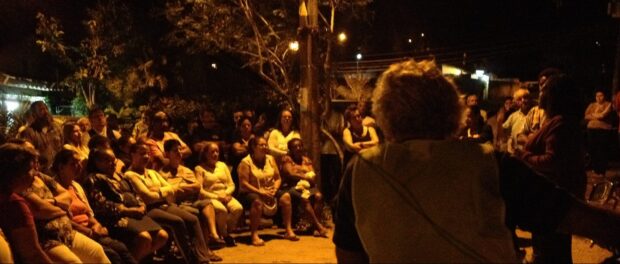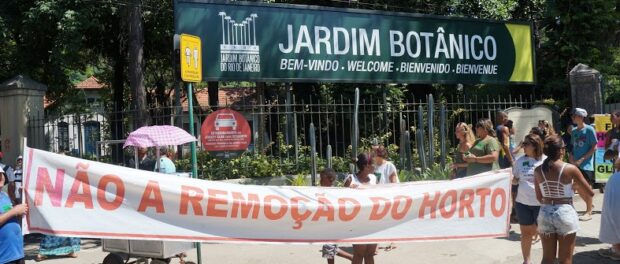
As night fell on Wednesday, September 13, residents of the Horto community in Rio’s South Zone met at an urgent meeting to discuss new circumstances in their ongoing fight against eviction. Community leaders from the Horto Resident’s Association (AMAHOR) informed the crowd of around 50 residents of recent developments in the neighboring Botanical Gardens’ efforts to remove families from their homes. Emília Maria de Souza, an ex-president of AMAHOR, warned the group gathered that in the coming days “the entire community must stay alert.”
She elaborated on the two events that prompted the emergency meeting, which had been announced via WhatsApp and Facebook the previous evening. She told the crowd that the day before, Tuesday, September 12, a resident had witnessed “people from IBAMA (The Brazilian Institute of the Environment and Renewable Resources) in the areas of Caxinguelê, Margarida, and Grotão.” De Souza continued: “They were photographing and taking notes. I said these people must be addressed to know what kind of mapping they are doing in the area.”
More concerning, she explained, was news that the President of the Botanical Gardens Research Institute, Sergio Besserman Vianna, had taken action to involve the Military Police in evicting Horto Residents. De Souza said she had learned the day before from a trusted source that the President “had already requested that the Military Police’s Shock Battalion give support for carrying out the evictions.” However, she said, “they can only do this operation in the community with the authorization of the area’s specific battalion, which is the 23rd. So yesterday the attorneys of the Botanical Gardens brought an official request to the 23rd battalion of the Military Police. As of yet, we don’t know what the decision of the commander will be about this solicitation.”
These words evoked images of last November’s violent forced eviction of Marcelo de Souza and his family by shock troops. Emília de Souza warned that this time the Botanical Gardens have requested the simultaneous removal of five families in various parts of the community, which typifies the city’s well-known ‘divide and conquer’ eviction strategy. The operation could be imminent if approved by the Military Police.
Horto has been resisting eviction from multiple fronts since the 1960s. The Botanical Gardens employed Horto residents over the community’s more than 200-year history, granting them the right to establish their homes on its boundaries. However, the institution now argues that they are “invaders” and must be removed to increase the size of the Botanical Gardens Research Institute’s area and “protect” the surrounding forest. Last year under Michel Temer’s government, a Federal Court of Accounts (TCU) decision approving the eviction of Horto residents bolstered the Gardens’ crusade. This went back on an earlier plan that would guarantee the permanence of the community alongside the Gardens’ expansion.
The gentrification of the surrounding neighborhoods of Gávea and Jardim Botânico and the desirability of Horto’s lush surroundings have also fueled real estate speculation. Emerson de Souza, the current present of AMAHOR, explained at the meeting that “there are areas of real estate speculation in Horto, and the entire community, without exception, is suffering and will continue to suffer because of this speculation… They are speculating over our lives and want to remove 521 families from Horto Florestal in criminal fashion.” Media giant Grupo Globo has reported that Horto’s property is valued at R$10.6 billion (currently US$3.4 billion). The location of Globo’s headquarters adjacent to the community and their ties to the Botanical Gardens put further pressure on Horto. Globo news articles have falsely framed the community’s residence there as “irregular occupation.”
Emília de Souza affirmed at the meeting that “they are allied: the Botanical Gardens, the city government, and the people from Globo. Our fight, our lives have nothing to do with the environmental question. Here, we are fighting against real estate speculation.” Other residents agreed that the profit motive behind the efforts to take Horto’s land was driving the Botanical Gardens, Globo, and government officials. Emília gave updates on the community’s political and legal resistance efforts. These include fighting individual eviction orders in court through a partnership with law students at the Pontifical Catholic University (PUC-Rio) and the State University of Rio de Janeiro (UERJ), lobbying members of the federal government to support Horto’s cause, and meeting directly with the Human Rights Commission at Rio State’s Legislative Assembly (ALERJ).
Horto’s residents do not know when the slated evictions of the five families recently revealed to be in danger will take place. They could happen at any time. At the meeting, Emerson and Emília de Souza and other residents called for renewed mobilization in the form of physical barricades and protest, techniques the community has used before to remain unified in face of removal. “We have to put our feet on the ground because the favela of Horto is on the Botanical Gardens’ eviction list,” concluded Emília de Souza. She argued that absolute and unified opposition was key for preventing future evictions. The crowd dispersed with plans to meet again and maintain the strength of resistance necessary to confront the ongoing threats to Horto.


